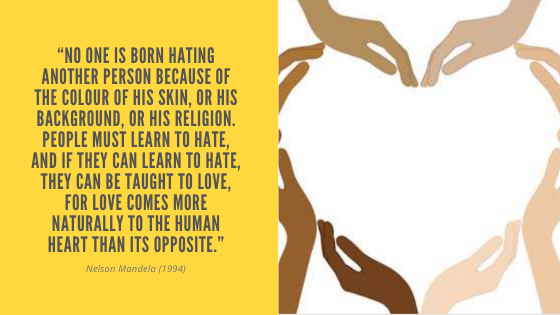
How to be an Ally & Talk to Your Children About Race, Injustice & Inclusivity
Racism stems from a larger picture. It is not solely based on an individual or a group of individuals, but how society is cultivated and a country is ran. Regardless, we must all do our parts, as every little change matters and makes a difference.
Several of my Black American/Canadian friends have been voicing out and sharing to raise awareness, but it’s draining for them to be constantly reiterating and sharing their experiences in order to get their point across. Black voices have been screaming to be heard and see action taken for many years, yet they have been muted for centuries and many of us are just now finally paying attention. So this is work WE ALL need to take responsibility for and do ourselves.
This blog will provide you some tips on how we can educate ourselves and our children to become allies. This post is for non-Black person of color, which also includes myself. I know many of us are saving resources to read up on, listen to, and to learn from on how to become an ally, especially given the recent news and social media posts. I wanted to share some tips that I’ve observed from a few articles and books I have read.
Tips on how to be Allies
1) Learn the differences between racism, racial prejudice and racial discrimination
2) Understand the ways in which fundamental American or even your own country’s ideologies shape people’s understandings of racism
3) Listen more; Talk less. You don’t have to say something all the time, give opportunity to those of people of color share their different experiences than your own. (Try not to make it about you if you feel that you cannot relate, or that it’s not something you would do – DON’T TAKE OFFENCE )
4) Resist the need to respond with a better or different insight about something that you read, or listened to as it relates to their shared opinion.
5) Being an ally requires you to educate yourself and do the work first. Read the article by Courtney Ariel – For Our White Friends Desiring To Be Allies, Michelle Alexander’s The New Jim Crow and Ta-Nehisi Coates’ Between the World and Me, and Robin DeAngelo’s White Fragility, and so many other great books and articles that illuminate oppression and structures of white supremacy and white privilege.
What if I have children I want to share this important message? How do I talk to them about race, injustice and inclusivity?
Here are some tips
1) Speak openly with them. Children will find out one way or another, we cannot hide information from them, so best to be open about it and for them to hear it from you as the parent or caregiver first.
2) When sharing facts keep it age appropriate. Often times, if they are younger, keep it to no more than the number of words or short sentences to their age. (ie: If they are 5 keep it to 5 words or short sentences, no more than 5, so that you’re not overwhelming them) If a child asks you questions, go find out and be honest that you don’t know than to simply give them an answer.
3) Approach the topic by asking the child what they know. This way you can correct any misconceptions/misinformation.
4) Don’t overload them with information.
5) Open for questions. Answer in factual manner and encourage them to ask questions when you’re ready.
Above all, I urge you to keep trying the following tips and to educate yourself more in this area. Understand that you are going to make mistakes; expect this and have compassion. But keep at this, Keep showing up and Be Compassionate. Remember to always lead with empathy. Keep learning and growing. If you do this, I truly believe you’ll be doing the work of an ally!

